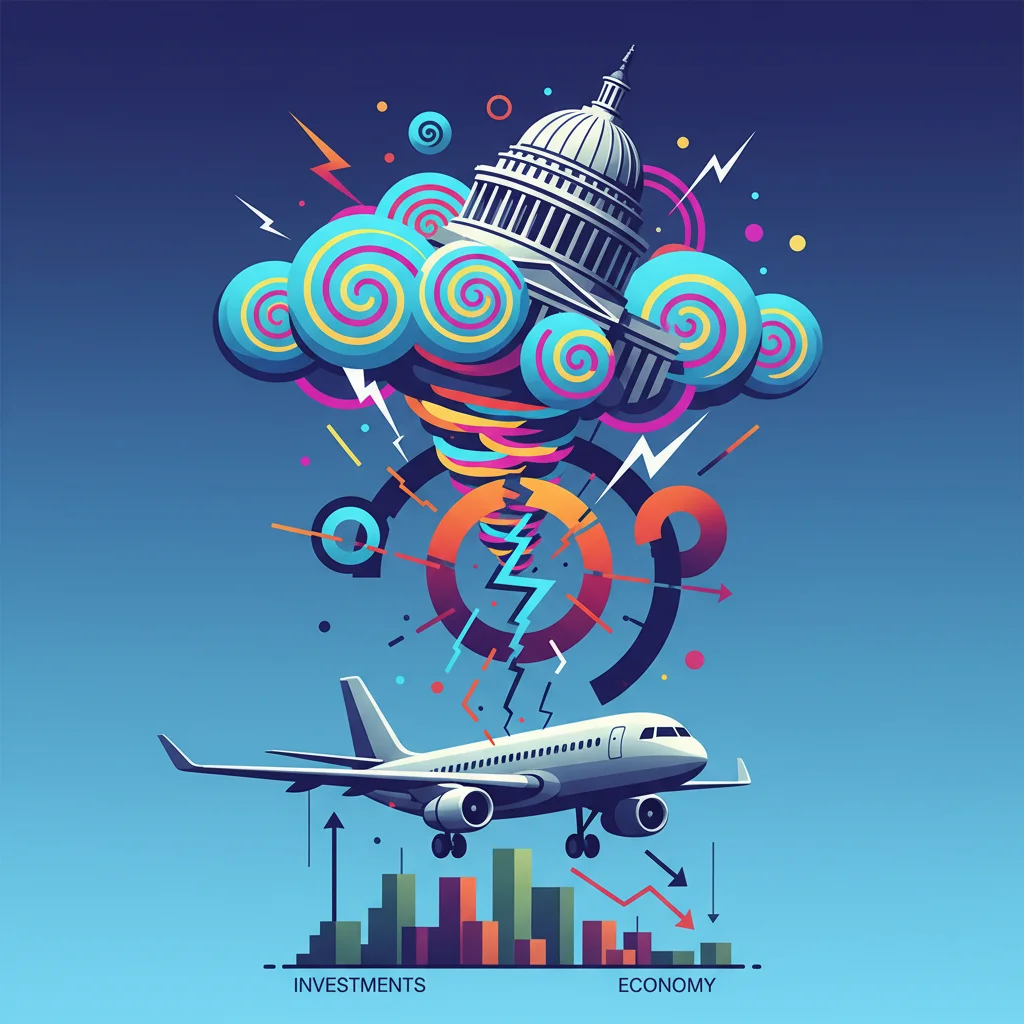
Grounded: How Government Shutdowns Create Turbulence for the Economy and Your Investments
The Unseen Costs of Political Gridlock: When Washington Stalls, Airports Stand Still
When the machinery of the U.S. federal government grinds to a halt, the immediate consequences often feel distant to the average citizen. Yet, for millions of air travelers, the reality of a government shutdown quickly becomes a cascade of delays, cancellations, and chaos. As highlighted by the disruptions faced by airlines during the third week of a federal funding freeze, the impact is swift and severe. However, the story doesn’t end at the departure gate. This operational nightmare is merely the leading edge of a much larger storm of economic and financial turbulence that ripples through the entire economy, affecting everything from corporate balance sheets to the stock market and individual investment portfolios.
Understanding this domino effect is crucial for business leaders, finance professionals, and savvy investors. A government shutdown is not just a political headline; it’s a significant market event with tangible costs. It directly impacts the operational capacity of a critical infrastructure sector, creating a chain reaction that tests corporate resilience, spooks investors, and offers a stark lesson in the interconnectedness of policy, industry, and finance.
The Anatomy of an Aviation Shutdown: Why Flights Get Grounded
To grasp the financial fallout, one must first understand the operational mechanics. The U.S. aviation system is a complex partnership between private airlines and the federal government. Two key agencies, the Federal Aviation Administration (FAA) and the Transportation Security Administration (TSA), are the lifeblood of this system. During a shutdown, their employees are deemed “essential,” meaning they must work without pay. This creates an immediate and severe morale problem that rapidly degrades into a staffing crisis.
Air traffic controllers, who manage the invisible highways in the sky, and TSA agents, who secure our airports, are highly skilled professionals. When their paychecks stop, many begin to call in sick—a phenomenon often referred to as a “sick-out.” The absenteeism rates can spike significantly, forcing the FAA to slow down air traffic to maintain safety. This means fewer planes can take off and land, creating a backlog that spreads across the entire country. A staffing shortage at a major hub like Atlanta’s Hartsfield-Jackson or New York’s LaGuardia can cause delays in Los Angeles and Chicago within hours. For airlines, this translates directly into canceled flights, crew scheduling nightmares, and millions in lost revenue.
Below is a breakdown of the key agencies and the shutdown’s impact on their functions, which are critical to the aviation sector and the broader economy.
| Federal Agency | Primary Aviation Role | Impact of a Government Shutdown |
|---|---|---|
| Federal Aviation Administration (FAA) | Air Traffic Control, Safety Inspections | Controllers work without pay, leading to staff shortages and traffic restrictions. Safety inspections and new aircraft certifications are halted. |
| Transportation Security Administration (TSA) | Airport Security Screening | Officers work without pay, causing longer security lines due to increased absenteeism and slower processing times. |
| Customs and Border Protection (CBP) | International Arrivals Processing | Essential staff work without pay, potentially slowing down the processing of international travelers and goods. |
| Department of Commerce | Economic Data (e.g., GDP, Travel stats) | The release of critical economic data that informs business and investment decisions is delayed, creating uncertainty in the market. |
The AI Gold Rush: Is Silicon Valley's Playbook a Gamble for the Global Economy?
The Economic Ripple Effect: From Tarmac to Wall Street
The financial consequences of aviation disruptions extend far beyond the airlines themselves. This is where the principles of economics and finance paint a much broader picture of the damage. The airline industry is a powerful economic engine, facilitating business travel, tourism, and commerce. When it sputters, the entire economy feels the jolt.
First, consider the direct impact on the economy. The Congressional Budget Office (CBO) estimated that the 35-day shutdown in 2018-2019 reduced real GDP by approximately $11 billion, of which $3 billion was permanently lost. A significant portion of this stems from reduced federal spending and investment, but the disruption to industries like aviation plays a major role. Business deals are postponed, conferences are canceled, and tourist destinations see a sharp drop in visitors. This lost economic activity is often unrecoverable.
For investors, the most visible impact is on the stock market. Airline stocks are notoriously sensitive to economic cycles, fuel prices, and operational stability. A government shutdown introduces a massive dose of uncertainty and operational risk. Wall Street analysts re-evaluate earnings forecasts, factoring in lost revenue and increased costs (such as rebooking passengers and paying crew overtime). This negative sentiment often leads to a sell-off in airline and travel-related stocks. Prudent investors engaged in trading must watch these developments closely, as the volatility can present both risks and opportunities. The key is to assess which airlines have the strongest balance sheets and are best positioned to weather the financial storm.
This situation also highlights the critical role of corporate finance departments within these companies. Managing liquidity and cash flow becomes paramount. Airlines have massive fixed costs—aircraft leases, maintenance, and non-furloughed staff—that don’t stop even when revenue plummets. This is where the relationship with banking institutions is tested, as companies may need to draw on lines of credit to cover short-term obligations. Modern financial technology, or fintech, also plays a part, with sophisticated treasury management systems helping CFOs model cash flow scenarios and make rapid decisions in a volatile environment.
The Investor’s Playbook: Navigating a Turbulent Market
For the finance professional or retail investor, a government shutdown is a signal to review, not to panic. The uncertainty creates market noise, but a disciplined approach grounded in sound economics and financial analysis can help navigate the turbulence.
1. Assess Company Fundamentals: Not all airlines are created equal. An investor should look beyond the headline noise and dive into the balance sheets. Which carriers have the most cash on hand? Who has the lowest debt-to-equity ratio? Companies with a strong financial cushion are better equipped to absorb the revenue shock of a shutdown without long-term damage. This is a classic test of corporate financial health.
2. Understand the Time Horizon: Short-term traders might see an opportunity to short airline stocks, betting on a quick drop. However, long-term investors might see a dip as a buying opportunity. Historically, the market impact of shutdowns is temporary. Once the government reopens and operations normalize, airline stocks tend to recover. The key is whether an investor’s strategy is focused on short-term trading or long-term value investing.
3. Diversify and Hedge: This event is a perfect reminder of why diversification is critical. An investment portfolio heavily weighted in travel and transportation stocks would be particularly vulnerable. Investors might consider balancing their holdings with counter-cyclical industries or those less affected by federal government operations. Hedging strategies, such as buying put options on a travel-focused ETF, could also be used to mitigate downside risk during the period of uncertainty.
Shell's Stock Surge: A Deep Dive into the Q4 Update Fueling Investor Optimism
4. Monitor Economic Indicators (When Available): A key, often overlooked, consequence of a shutdown is the halt in the publication of government economic data. Reports on inflation, employment, and GDP from the Bureau of Labor Statistics and the Department of Commerce are delayed. This blinds investors and the Federal Reserve, making it harder to gauge the health of the economy and make informed decisions. When the data is eventually released, it can lead to market volatility as everyone rushes to catch up.
The ,900 Gold Prophecy: Is Goldman Sachs Predicting a New Gilded Age?
Conclusion: A Costly Lesson in Interdependence
A government shutdown is far more than a political spectacle confined to Washington D.C. As the chaos at the nation’s airports demonstrates, its effects are immediate, tangible, and costly. The initial operational disruptions in the airline industry are a bellwether for deeper financial and economic consequences, impacting corporate revenues, shaking the stock market, and challenging investment strategies.
For business leaders, it’s a stark reminder of the importance of contingency planning and robust financial management. For investors, it underscores the need to analyze systemic risks and maintain a diversified, long-term perspective. Ultimately, the grounding of flights serves as a powerful metaphor: when political gridlock prevents the essential functions of government from taking off, it’s the entire economy that risks being left on the tarmac.


